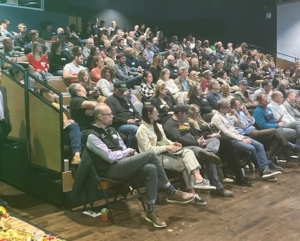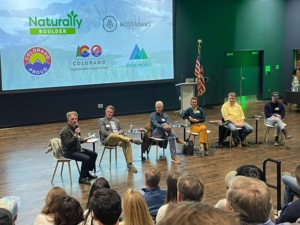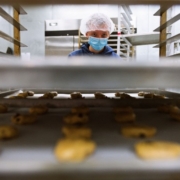Co-manufacturers are a catalyst in Colorado’s high-flying food industry. But here’s why brands are struggling to find right-sized manufacturing
Takeaways from the first Colorado Food & Beverage Co-Manufacturing Summit
Aerospace gets the headlines, but more Coloradoans work at food companies than in any other manufacturing industry in the state – over 26,000 employees and another 10,000 or so in beverage businesses. As long ago as 2013, growth in this powerhouse sector convinced me that America’s newfound love affair with locally made products would extend to other industries.
Manufacturing innovation in the form of industry-savvy co-packers was a catalyst then and remains so today. Co-packers manufacture for multiple brands, providing hard-to-develop production expertise — and scale — as they also free up customer leadership to focus on products, on sales and marketing – on business.
But as capable as the co-manufacturing (the new term for co-packing) ecosystem has become, it’s also become difficult for smaller, entrepreneurial companies to find right-sized solutions. In some ways, industry success has begotten a less accommodating co-manufacturing ecosystem.
It’s nothing the industry can’t solve, and to that end, I recently worked with Naturally Boulder to host the first Colorado Food & Beverage Co-Manufacturing Summit. Here are some of the takeaways from the panel discussion with co-manufacturers and food brands – for nearly 200 attendees:
By way of challenges in the food industry, there are plenty. It’s been a perfect storm of post-pandemic uncertainty, inflation-induced interest rates hikes, and a fast-changing wholesale and distribution landscape.
As a result, capital is much harder to come by. More brands are competing for limited space on grocery store shelves and freezers. And as panelist Lee Gray, a food-industry attorney, pointed out, consumer class-action lawsuits are more prevalent than ever: there’s no shortage of aggrieved consumers (and lawyers) suing for alleged false or misleading labels.
Macro-industry challenges have been amplified by operational headwinds. Though Colorado’s sector is 27th nationally in total food-related jobs, average wages in Colorado’s sector rank 12th nationally. And food inspectors, from the FDA for example, have shaken off the COVID malaise and are active once again.


This means the industry is more risk-averse today than in previous years. Co-manufacturers are more selective in the brands they choose to work with.
That said, brands can trust that familiar attributes will always open doors. An “ideal client” as described by the co-man panelists would be one with an experienced management team, transparency, a willingness to collaborate, mutual respect — and of course, resources and capital.
Panelists also encouraged brands to develop a direct-to-consumer channel, focus on products that are more shelf stable, stay flexible (be ready to pivot), reinvent yourself when necessary, and let go of old business practices that no longer serve you.
Product trends shape any conversation between a brand and co-manufacturer, and panelists agreed on several: Gluten-free and clean ingredients here to stay – in fact, engineered meat products are challenged today because of their complex makeup. Better-for-you low-sugar products will continue to grow in popularity. Keto is a sustaining trend (for now, with some reservations), as are simple and short ingredient lists, including ingredients for gut-and-brain health.
Other takeaways from the Summit will inform go-forward efforts to develop a transparent and accessible regional co-manufacturing ecosystem. Beverage co-manufacturing is on the rise – in fact, we’ll convene a bev-specific summit this spring. Colorado Proud – the popular marketing program from the CO Department of Agriculture – is developing a new digital co-manufacturing directory. (Brands and co-mans: I’ll connect you with Colorado Proud to ensure you’re listed).
More next time.
Bart Taylor is a Moss Adams BDE and founder and former publisher of CompanyWeek manufacturing media. Reach him at bart.taylor@mossadams.com.
Panelists at the first Colorado Food & Beverage Co-Manufacturing Summit:
Bart Taylor, Moss Adams
Lee Gray, Gray Bugos & Schroeder, LLC
Alex Cioth, Founder & CEO, Claremont Foods
Zora Tabin, Chairwoman, Wild Zora Foods
Chris Lehn, Founder & Owner, Made4U Foods
Benjamin Frohlishstein, Co-founder, Cappello’s



